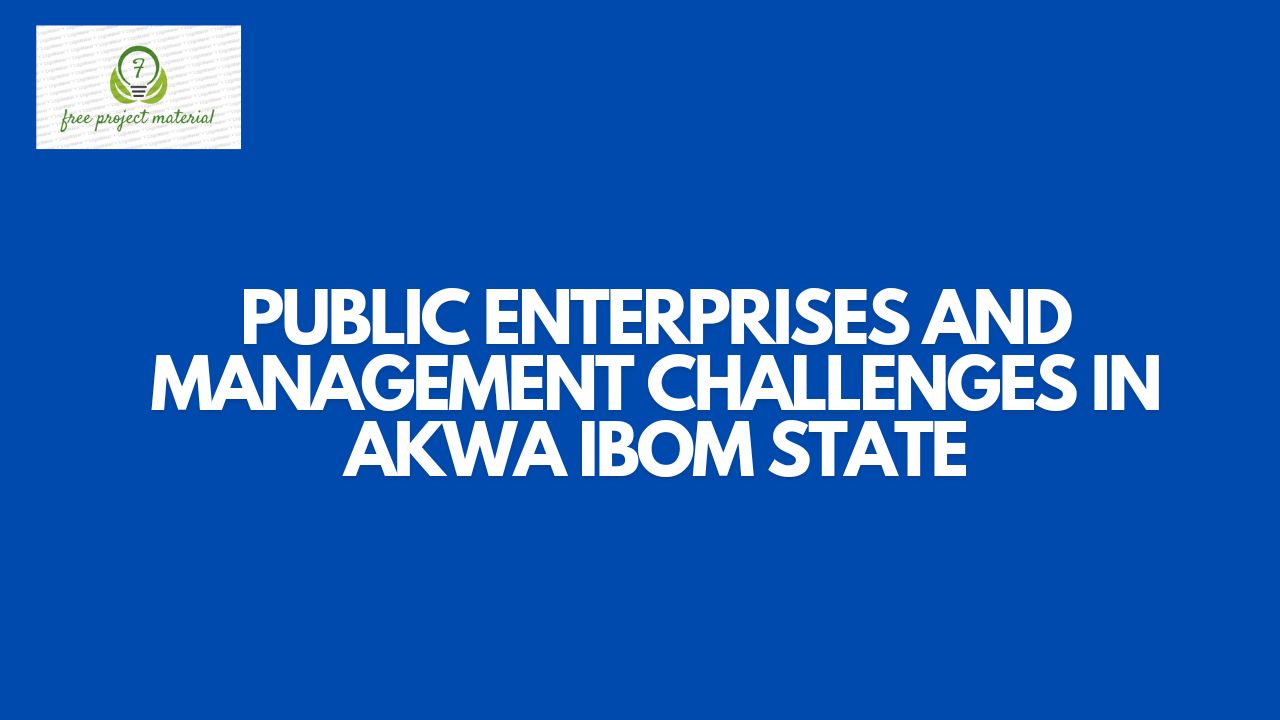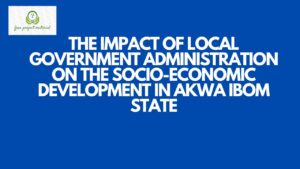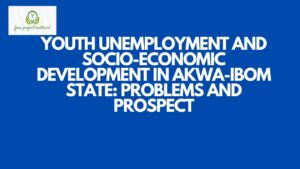ABSTRACT
This study was designed to examine Public Enterprises and Management Challenges in Akwa Ibom State (a case study of Peakcock Paints Ltd.) To accomplish the objectives of the study, the study adopted the survey research design while the Taro Yamane formula was used to select twenty-eight (28) respondents as the sample size for the study. Instrument of the study was a self-developed questionnaire and the forms were personally administered. Research questions were formulated to guide the study and data were analyzed using the descriptive statistical tools which involved the use of simple percentages and frequency tables. Based on the data analysis, findings of the study revealed that; government make funds available to public enterprises once in a while. The impacts of limited autonomy of Nigerian public enterprises in personnel management are; slow growth, poor management and delay in the execution of decision. Financial mismanagement, poor funding and poor attitude to work by staffs are the management problems faced by public enterprises in Akwa Ibom State. Therefore, much still needs to be done in ensuring that Nigerian consumers enjoy maximum benefits in the services provided by companies that emerged from the ashes of public enterprises.
LIST OF TABLES
Table 4.2.1: Responses to Research Question One – – – 34
Table 4.2.2: Responses to Research Question Two – – – 35
Table 4.2.3: Responses to Research Question Three – – 36
Table 4.2.4: Responses to Research Question Four – – – 37
Table 4.2.5: Responses to Research Question Five – – – 38
TABLE OF CONTENTS
Cover Page – – – – – – – – – i
Approval Page – – – – – – – – ii
Certification – – – – – – – – – iii
Dedication – – – – – – – – – iv
Acknowledgment – – – – – – – – v
Abstract – – – – – – – – – vi
List of Tables – – – – – – – – vi
Table of Contents – – – – – – – – vii
CHAPTER ONE: INTRODUCTION
1.1 Background of the Study – – – – – – 1
1.2 Statement of Problem – – – – – – 5
1.3 Objectives of The Study – – – – – – 7
1.4 Research Questions – – – – – – 8
1.5 Significance of the Study – – – – – – 9
1.6 Scope and Limitation of the Study – – – – 9
1.7 Definition of Terms – – – – – – 10
CHAPTER TWO: REVIEW OF RELATED LITERATURE
2.1 Introduction – – – – – – – – 12
2.2 The Concept of Public Enterprise – – – – 12
2.3 Characteristics of Public Enterprises – – – – 14
2.4 Rationale for Public Enterprises – – – – – 16
2.5 Reasons for the establishment of Public Enterprises – 17
2.6 Challenges Facing Public Enterprises in Akwa Ibom State – 19
2.7 Managing the Challenges of Public
Enterprises: Privatization Option – – – – 25
CHAPTER THREE: RESEARCH DESIGN/ METHODOLOGY
3.1 Introduction – – – – – – – – 30
3.2 Research Design – – – – – – – 30
3.3 Population of the Study – – – – – – 31
3.4 Sample and Sampling Technique – – – – 31
3.5 Instrumentation – – – – – – – 32
3.6 Plan for Data Analysis – – – – – – 32
3.7 Problems for Data Collection – – – – 32
CHAPTER FOUR: DATA PRESENTATION AND ANALYSIS
4.1 Introduction – – – – – – – – 34
4.2 Data Presentation, Analysis and Interpretation – – 34
4.3 Discussion of Findings – – – – – – 39
CHAPTER FIVE: SUMMARY, CONCLUSION AND RECOMMENDATIONS
5.1 Summary – – – – – – – – 42
5.2 Conclusion – – – – – – – – 42
5.3 Recommendations – – – – – – – 43
References
Appendix
CHAPTER ONE
BACKGROUND OF THE STUDY
1.1 INTRODUCTION
The origin of the involvement of the Nigerian government in the setting up of public enterprises can be placed within the context of Nigeria’s colonial and postcolonial experiences. During colonial rule and after independence in 1960, it was discovered that it was imperative that the government must be involved in business activities as an entrepreneur to perform some business roles, secure economic independence and economic development for the nation because of the absence of capable indigenous entrepreneurs with enough technical knowhow and financial capacity to compete with foreign firms operating in the country then. Therefore, public enterprises (PEs) were established expressly to combat the dependence on foreign enterprises, to reduce the export of capital and most importantly to engage in those enterprises which are not so attractive to local and foreign investors but which are nonetheless necessary for the development of the country. Thus, in Nigeria, one of the factors that accelerated the growth of public enterprises was the indigenization policy of 1972 as enacted by the Nigerian Enterprises Promotion Decree. It was designed to control the commanding heights of the economy by Nigerians not foreigners as was the case previously. The policy further provided the much needed legal basis for extensive government participation in the ownership and control of significant sectors of the economy. Thus, from inception, public enterprises were established through the instrumentalities of the application of state power to fill an observed vacuum in the economic development of the country. Decades after independence the Nigerian government has continued to run these PEs for other sociopolitical and economic reasons other than those adduced shortly after independence in 1960. Some of the reasons the federal government has continued to run PEs include the shortage of local capital for expansion and technological improvements; control of the commanding height of the economy by government to prevent a few elites from enriching themselves at the expense of majority of Nigerians; correction of market failure resulting from monopoly and misallocation of public resources; facilitating regional development through location of PEs and their branches and job creation and provision of social services.
Globally, public enterprises are established to act as the pivot to propel economic and social development in areas of need. The implication here is that the government assumes the function of the entrepreneur by investing her resources in business ventures for social and economic reasons. However, evidence abounds that the government has not performed well as a manager of resources. For instance the failure of public enterprises such as Nigeria Airways, NITEL, National Electric Power Authority (NEPA), Nigeria Railways, Nigeria Airways e.t.c. indicates that most public enterprises have failed woefully to live up to the expectations of the Nigerian public. At the state level, most government owned corporations have been liquidated due to high operating losses while those still in operation depend on government subsidies and support to survive. Therefore it can be safely argued that PEs constitute a financial burden to any government if they are not self sustaining. This state of affairs has necessitated the clamour for the outright sale, liquidation or privatization of public enterprises in order to channel government resources to other productive uses as witnessed in the early 90s.
The major hull mark in the evolution of Public Enterprises in Nigeria came with conversion of public utilities operated under the governmental departments into public corporation. The most important Public Enterprises set up during the era (1945-60) was the west African produce marking board; apart from this, many development corporations sprang up in the late 1950s etc. Some Public Enterprises were also established in Nigeria between the end of world War 11. On attainment of political independence, a number of Public Enterprises were derived from the Nigeria’s ten year development plan. They were aimed at achieving a dual purpose of earning profit and other societal objectives such as creating employment and reduction of mass property. In early 1970s, there was greater indegnization and nationalization of private/ foreign entities into Public Enterprises with an overt intent of returning the economy to the Nigerian people. Since 1970s, successive governments have used public corporations and state owned companies as a tool of public intervention in the development process.
The primary purpose is to stimulate and accelerate National economic development under conditions of capital scarcity and structural defects in private business organizations. There are also basic considerations arising from the dangers of leaving vital sectors of the national economy to the whims of the private sectors often under the direct and remote controls of foreign large-scale industrial combines.
Strategically, the important sectors of the nation were classified as industries that are vital to maintaining the territorial, economic and political sovereignty of the nation with which, or if controlled by hostile powers, the effective functions of the state could potentially collapse. Consequently, Public Enterprises especially in developing countries such as Nigeria became active in key sectors like manufacturing; construction, Agriculture and natural resources etc. to ensure the absolute government control of these Public Enterprises and to improve the living standard of Nigerian people. Thus, this study aims to assess public enterprises and management challenges in Akwa Ibom State using Peakcook paint as a case study.
1.2 Statement of Problem
Nigerian Public Enterprises were created for the purpose of expediting and facilitating economic development. However, most public enterprises in Nigeria are bedeviled by myriads of problems which constrain their ability to deliver on their core mandate. While they were created to fill the vacuum created by the private sector before and shortly after independence to spearhead the development of Nigeria in sectors considered vital, many of them have performed below expectation by not discharging their duties diligently and efficiently.
It has been observed that inadequate funding of Public Enterprises by government make their operation difficult, if not impossible. AS a result, they also determined the tariff structure, which would have been an avenue to raise more funds to improve their performance. Cliff (2010) stressed that most Public Enterprises in Africa were set up with a low equity capital base; thus making it difficult even to get financial assistance from banks. Poor capitalization was an impediment to borrowing, thereby contributing to negative performance.
Also, there is wide spread assertion that Public Enterprises have limited autonomy in areas of personnel management and authority to spend their funds without obtaining approval from the chief executive or the supervising ministry.
In support of this notion, Obadan (2011) argued that Public Enterprises managers suffer excessive control in their daily operations by the supervising government departments. This often stifles managerial initiatives and leads to costly operational inefficiencies of PEs. In practice however, because the government provides all their funds, they have not been enjoying appropriate autonomy to function as a viable entity.
Moreover, Public Enterprises are often seen as instruments of political patronage by the government in power. No wander, Ezeani (2006) opines that there is excessive political interference in the operation of the Public Enterprises. This results in overstaffing, poor choice of products and location, recruitment of mediocre into the Public Enterprises. In the same vein, Nellis (2005) observed that there is unstable management/boards in Nigerian Public Enterprises. Any new government is likely to dissolve and appoint its own board members and general managers once they take control of state power. They further argued that these appointments are not based on merit as they see it as a way of compensating their cronies and allies, and because of this, the board members could hardly achieve anything positive before their removal.
In furtherance of this, there is problem of poor technology in Nigerian Public Enterprises. For instance, some plants are designed to use only the certain quality of raw materials; it became impossible for such plants to operate. In some cases, it is amazing to know that part of the problems were installation of wrong technology in our Public Enterprises. These technical errors resulted to ineffectiveness and loss of resources (Tried, 2005)
It is against this backdrop that the study seeks to assess public enterprises and management challenges in Akwa Ibom State using Peakcook paint as a case study.
1.3 Objectives of the Study
- To determine the rate to which fund is made available to Nigerian Public Enterprises by the government.
- To ascertain the impact of limited autonomy of Nigerian Public Enterprises in personnel management.
- To ascertain the management problems face by Public enterprise in Akwa Ibom State
- To determine the impact of government influence in managing the affairs public enterprise in Nigeria.
- To determine the means of improving public enterprise managerial performance
1.4 Research Questions
- What is the rate at which funds is made available to Nigerian Public Enterprises by Government?
- What are the impacts of limited autonomy of Nigerian Public enterprises in personnel management?
- What are the management problems face by public enterprises in Akwa Ibom State?
- What are the impact of government influence in managing the affairs of public enterprise in Nigeria?
- What are the means of improving public enterprise managerial performance?
1.5 Significance of the Study
This study will help to intimate management on the means of sorting some managerial problems so that both workers and organizations will benefit, and the public enterprises will achieve more in future.
This study will help to intimate the relevant government authorities and ministry on the need to step of performance in public enterprises
This study will serve as a source of information to the stakeholders of resources management in Akwa Ibom State on the state of the dilapidating public enterprise which could be instrumental in decision making
This study will serve as a reference materials for students and researchers in this field of study.
1.6 Scope and Limitation of the Study
This scope of this study encompasses the management challenges of public enterprises in Akwa Ibom State but with close reference to Peacock paint. This study was delimited due to time, financial constraints, the reluctant attitudes of respondents to give the relevant information and data for the purpose of this work.
1.7 Definition of Terms
Ware House- A warehouse is a commercial building for storage of goods. Warehouses are used by many factors, importers and exporters, wholesales, transport business, customs etc. they are usually large plain buildings in industrial parts of town. They come equipped with coaling docks to load and unload trucks or sometimes are loaded directly from railways, airports or seaports. they also often lave cranes and forklifts for moving goods.
Marketing- Is the process by which term applied to the craft or making the producers or a product or service with customers, both existing and potential. It provide any direction to someone hoping to market his products or services effectively with that, a more modern explanation of what marketing is and what makes it effective. Market56ing is a four step process that begins with analysing and defining a qualified universe of potential users or buyers.
Consumer Market- The consumer market deals with the last final customer who buys the product for their main satisfaction/personal use or student consumer, you could possibly be a member of the markets of the markets for “brand name “ clothing and shoes, cottage book backpacks, newspapers and bicycles. The consumer market covers a wide variety of people o0f different ages, tender race and etc as long as they also the end user of product.
Enterprise Management Services
This provide complete life cycle and configuration management of enterprise assets through an integrated toll suite, we provide “cradle to grave” services utilizing a suite of product for4 standardized, repeatable processes for procurement. The enterprise management service database provides the resource for continually assessing and improving customer service.
Sales– Sales or the activity of selling forms an integral part of commercial activity mastering sales is considered by many as some sort of persuading “art on the contrary, the methodological approach of selling, refers to it as a systematic process of repetitive and measurable milestones, by which a sales persons relate his offering enabling the buyer to visualized how to achieve his goal in a economic way. Selling is a practical implementation of marketing. It often forms a separate grouping in a corporate structure, employing a separate specialist operatives known as sale men.



